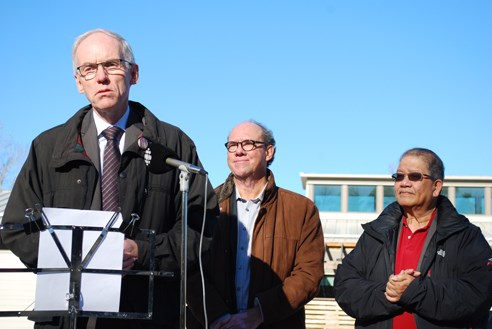The provincial government is building a six-bed, 9,000-square-foot crisis centre in Thompson for youth with mental health and addictions issues at a cost of $7 million, Thompson MLA and Minister of Infrastructure and Transportion Steve Ashton announced Oct. 8.
The facility, which will be called Hope North: Recovery Centre for Youth, will be located south of the Addictions Foundations of Manitoba (AFM) Eaglewood Treatment Centre on Princeton Drive.
“This new facility will provide a permanent site for clinical support as well as short-term crisis beds for youth in need of mental health and addictions services,” said Health Minister Sharon Blady in a press release. “This means culturally appropriate services for youth and families living in the north will be available closer to home, reducing the number of young people diverted Winnipeg for assessment and treatment.”
The permanent crisis centre, expected to be completed and operational by late 2016, will include a four-bed crisis stabilization unit to provide a secure environment for youth experiencing mental health crises, including youth at risk of suicide, for up to one week. There will also be a two-bed youth addictions stabilization unit for youth who are severely and persistently abusing drugs and alcohol, who can be involuntarily admitted under the terms of the Youth Drug Stabilization (Support for Parents) Act. The centre will also serve as the base for mobile crisis and outreach services, which include in-person intervention and assessment for youth in crisis in Thompson and within a 110-kilometre radius, as well as for Telehealth and phone-based consultation throughout the Northern Regional Health authority (NRHA).
“This is about hope,” said Ashton at a press conference in the parking lot of the AFM building near the construction site of the youth crisis centre. “It's about providing hope to young people and families, providing hope in terms of crisis intervention at critical stages. I've seen too many times in communities in our area where it's an epidemic of suicide and it doesn't just happen. It's the result, in many cases, of a sense of hopelessness. I want to credit everyone that's been a part of developing this and I want to stress again that this is just one more step as part of our mental health strategy here in Northern Manitoba.”
Dr. Shelley Rhyno, the director of behavioural health for the NRHA, said the crisis centre would enable the provision of better services to youth in need.
“This has been an amazing journey of hard work to transform a much-needed service in the north from a vision of care for our youth and their families who are in stress to the reality of practice,” Rhyno said. “Our facility will be grounded in the philosophies of recovery-oriented, trauma-informed and culturally safe practices. As we move forward with operational planning we will be inviting our First Nations stakeholders, our service users and the community that we serve to collaborate with us and share in the next phase of our journey so that we can ensure that the philosophy that we wish to achieve is embodied in everything we do. From here on out the important message will be sent to all youth who enter the doors that recovery is possible and hope changes everything.”
The youth crisis centre will also include a common room, a quiet room, a family therapy room, a mobile crisis services office, staff offices, an examination room and meeting areas and be equipped with a mobile Telehealth unit. The building will meet or exceed Manitoba Green Building Program requirements and achieve a Manitoba Hydro Power Smart designation thanks to energy-efficient design that will result in lower power consumption and improved indoor air quality and ventilation. The design will also incorporate culturally relevant symbolism, natural lighting throughout and a connection to the environment with large windows looking out into the woods.
Blady says planning for redevelopment and expansion of the Northern Consultation Centre in Thompson is also continuing.
Finance Minister Greg Dewar and Tyndall Park MLA Ted Marcelino were also at the announcement in Thompson, which they were visiting as part of their budget outreach tour.




